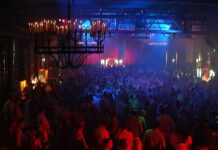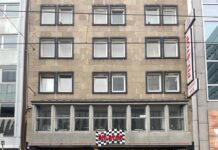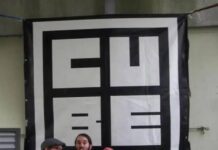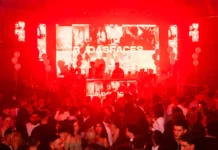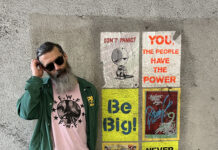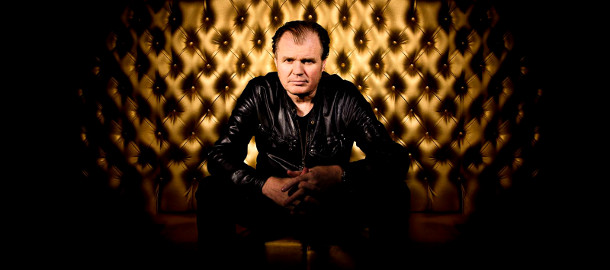
Foto: Adam Szigeti
Rusty Egan has been a pivotal figure in the UK music scene for decades now, but his heart beats to a steady Motorik rhythm. The musician and DJ has not only had a severe influence on the British music scene throughout the 80s, but also knows his Düsseldorf. For us, Egan has prepared a podcast in anticipation of the ELECTRI_CITY Conference in Düsseldorf from the 29th to the 31st of October.
How did you come in contact with the Düsseldorf scene?
After the demise of Rich Kids, Steve Strange and I were going out to underground clubs in search of fun. My love for the music of the past – Roxy Music, Brian Eno, David Bowie, Kraftwerk, Giorgio Moroder and Soul classics – was not enough and the clubs played US Funk and Pop and Euro Pop Trash. Current UK-based bands like Magazine, Ultravox and Simple Minds were failing to get radio and club plays but were building a new sound, electronic synth based music. I was so incensed that I suggested to Steve that we start our own weekly night in an empty small club. Thus, Bowie Night at Billy’s was born. I searched for new music to play and found Yellow Magic Orchestra, Yello, Telex and Kraftwerk, who were all making tracks with synths and drums machine I could play. Within three months, we moved the club to The Blitz in Covent Garden and I went to Düsseldorf and Berlin in search of more music. I asked around where can I find Kraftwerk and was told to go to the Melesh Club on Königsallee. They were right! I met Ralf (Hütter) and Florian (Schneider) and told them about London, my DJing nights and how their songs were the future of night club music. I gave them my number and was very, very happy when they came to my Club for Heroes in 1981 and back to my house after their Hammersmith Concert. My collection was growing and so was The Blitz. We created a studio band called Visage to make music for The Blitz and Steve was the perfect singer and front man. Billy Currie was stolen to tour with Gary Numan and Midge Ure headed off to America to tour with Phil Lynott, so Visage was put on a back burner. But on their return Billy brought the basic „Fade to Grey“ idea with Chris Payne and Midge brought „Yellow Pearl“, a track which features my drumming inspired by La Düsseldorf and which later became the theme tune to Top Of The Pops in the UK.
Why has this relatively small city made such an impact on electronic music?
Because the music was German! That was the real point. I was not looking for American or UK Music. It needed to be from anywhere but the mainstream. Once I had the German language mixes, adding Bowies „Helden“ and anything I could find in different languages. The club soundtrack and the clothes on the people took the club to a level never seen. The people had a soundtrack to their otherwise gray future in Thatcherite Britain in the end of the 70s and at the start of a new decade. The music was experimental and Music for Airports by Brian Eno was influenced by his trips to Moebius, Roedelius and Cluster. Eno took this to Berlin for his work with Bowie and Iggy and the Berlin Trilogy, The Idiot and Lust for Life albums. Low, Heroes and Lodger were all featured heavily in The Blitz Club enticing Bowie to visit the club in 1980 for „Ashes to Ashes“ video extras .
Where and how did you record the mix?
I am a fan of Native Instruments‘ Traktor Scratch Pro, I use it to record my radio show The Electronic Family Tree in which I am tracing the roots of Electronica into today’s musicians. I make my shows and my mixes all in this digital format using two decks, I recorded it in London. I am promoting Synth Pop bands who will appear at the ELECTRI_CITY Conference: Vile Electrodes, Len Sander, Metroland, and Tiny Magnetic Pets. I am so excited to see Michael Rother, a true pioneer.
Obviously, your mix focuses on music made in Düsseldorf. But how did you decide which tracks you wanted to include?
Kretz‚ „Electro Life“ is a fantastic opener, I am a big fan of their sound. They have delivered some amazing electronic music packages equal to the masters, Kraftwerk. Heaven 17 created „Being Boiled“ in Sheffield when they were all in Human League, splitting up and creating the British Electric Foundation. This mix is perfect as they come from Sheffield, the city of steel. It mixes into „Metall Auf Metall“ by Kraftwerk and then into Deutsche Bank’s „Machine Pop“. Deutsche Bank really are producing where Kraftwerk left off. If it takes Ralf Hütter another ten years to make a new album, there is enough here to fill the gap. „Outside Inside“ by Kurt Baggaley was the first track I heard that confirmed to me that Kurt was going to be an important creator. Adding „Former Self (Drifter Remix)“ later in the mix proves that. It’s a masterpiece. Metroland’s track is a take on Bowie and Iggy Pop’s „The Passenger“, a song written in Berlin when Bowie and Iggy were living together describing their trips in the car late at night after the studios and visit to Romy Haag’s club. Kraftwerk’s „Musique Non Stop“ just is exactly what the mix is: non-stop and that’s the love for it. I love to hear one track merge into another and the beat comes and goes, but always there is no stopping! In „Alles im Namen der Menschheit“ by Kretz the German language in the mix reminds you that this is electronic music and it started here. Even if we take you on a journey „From Station to Station“ with Metroland or to „Shinjuku Station“ by Deutsche Bank and then to the FPU mix of „Crocket’s Theme“, it blends perfectly to remind you of the influence that has carried across the water into the 80s, when Hip Hop was born from the electronic beats of Kraftwerk’s „Numbers“. „Love On A Real Train (Williams Odyssey Mix)“ by Tangerine Dream is the basis of Chilled Beach House but really it’s 70s Krautrock – what a bad wrong term for the future of synth music! There was no rock – only long hair. The UK Band Vile Electrodes enforce the message that we are all „Damaged Software“ with an amazing bass. „Fluthering Lights“ by Len Sander proves the Swiss have finally found it. I love all four tracks released so far and expect something amazing very soon. In closing we are now in at „Computer World 2“ by Kraftwerk. This music is the basic roots of all electronic dance music. I wrote a song with the UK band Tenek taking their bass and adding the lyrics of each city in the world that has produced a band, DJ, club or record that we now „Welcome To The Dancefloor“ It’s a Mark Reeder mix. Mark and I met in Berlin last year and discussed working together. His B-Movie is a must if you want to trace the influence from Düsseldorf to Berlin, London, Manchester and back to Berlin. Because of Düsseldorf and Köln musicians, we have the future: David August, Solomun, Jon Hopkins and Max Cooper.
We are giving away 3×2 tickets for ELECTRI_CITY Conference on Saturday, October 31st, including the shows by Len Sander, Vile Electrodes, Metroland, Delta and BAR. Please send us an e-mail with the subject line Düsseldorf until Thursday, October 29th!
Stream: Rusty Egan – Electri_city Conference 2015 Podcast
Download (MP3, 320 kBit/s, 60:03 Min., 137 MB)
1. Kretz – Electro Life
2. Heaven 17 – Being Boiled
3. Kraftwerk – Metall Auf Metall
4. Deutsche Bank – Unterwegs In Meinem Saab
5. Kurt Baggaley – Outside Inside
6. Heaven 17 – Let Me Go (DJ Steef Edit)
7. Metroland – The Passenger (12″ Backside Version)
8. Kraftwerk – Musique Non Stop
9. Kretz – Alles im Namen der Menschheit
10. Deutsche Bank – Shinjuku Station
11. FPU – Crocket’s Theme
12. Tangerine Dream – Love On A Real Train (Williams Odyssey Mix)
13. Kurt Baggaley – Former Self (Drifter Remix)
14. Metroland – From station to Station (f)
15. Vile Electrodes – Damaged Software
16. Len Sander – Fluthering Lights
17. Kraftwerk – Computer World 2
18. Rusty Egan – Welcome To The Dancefloor
